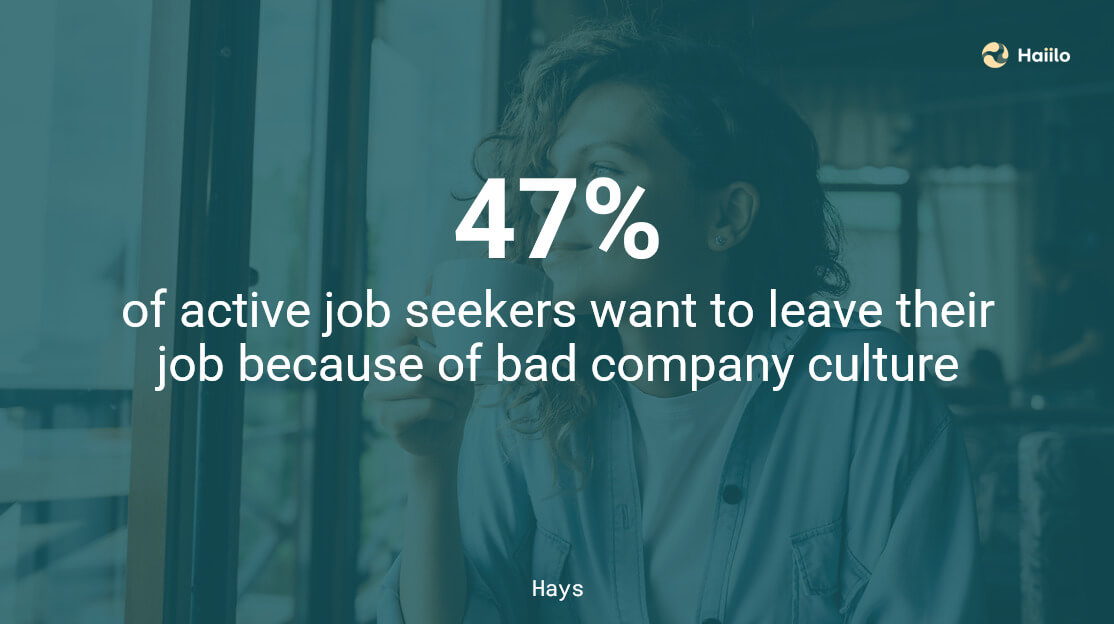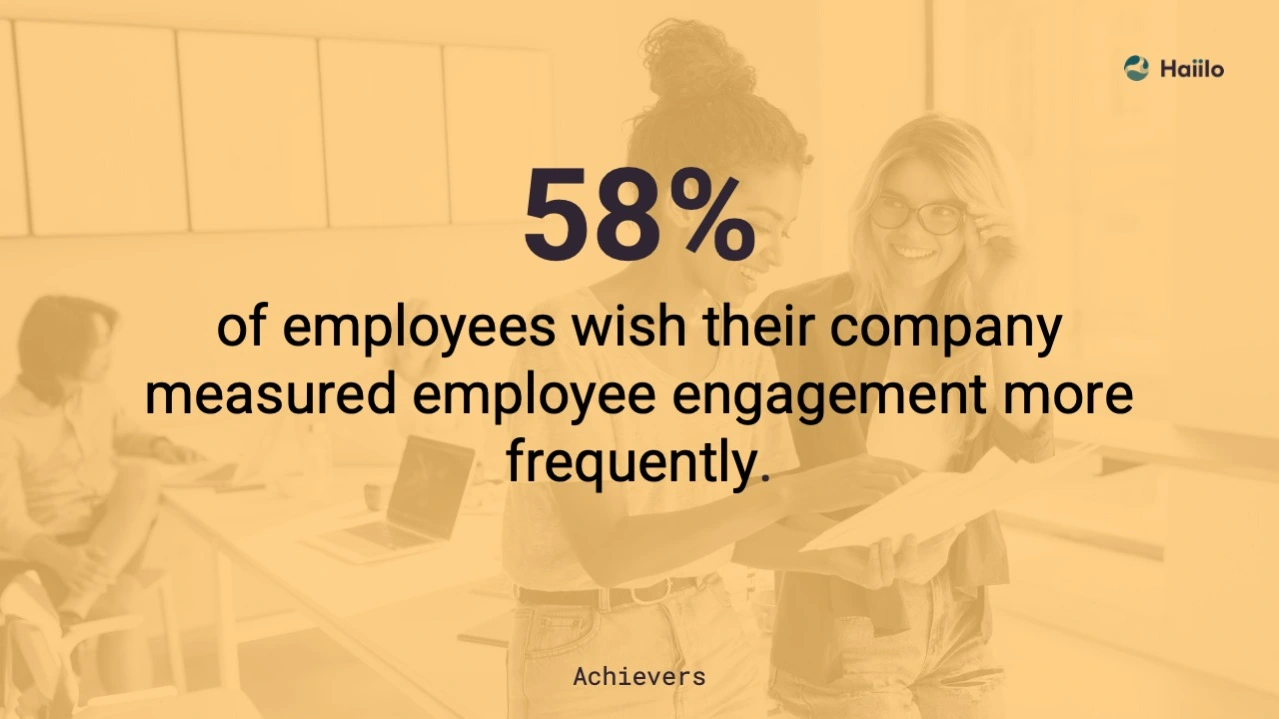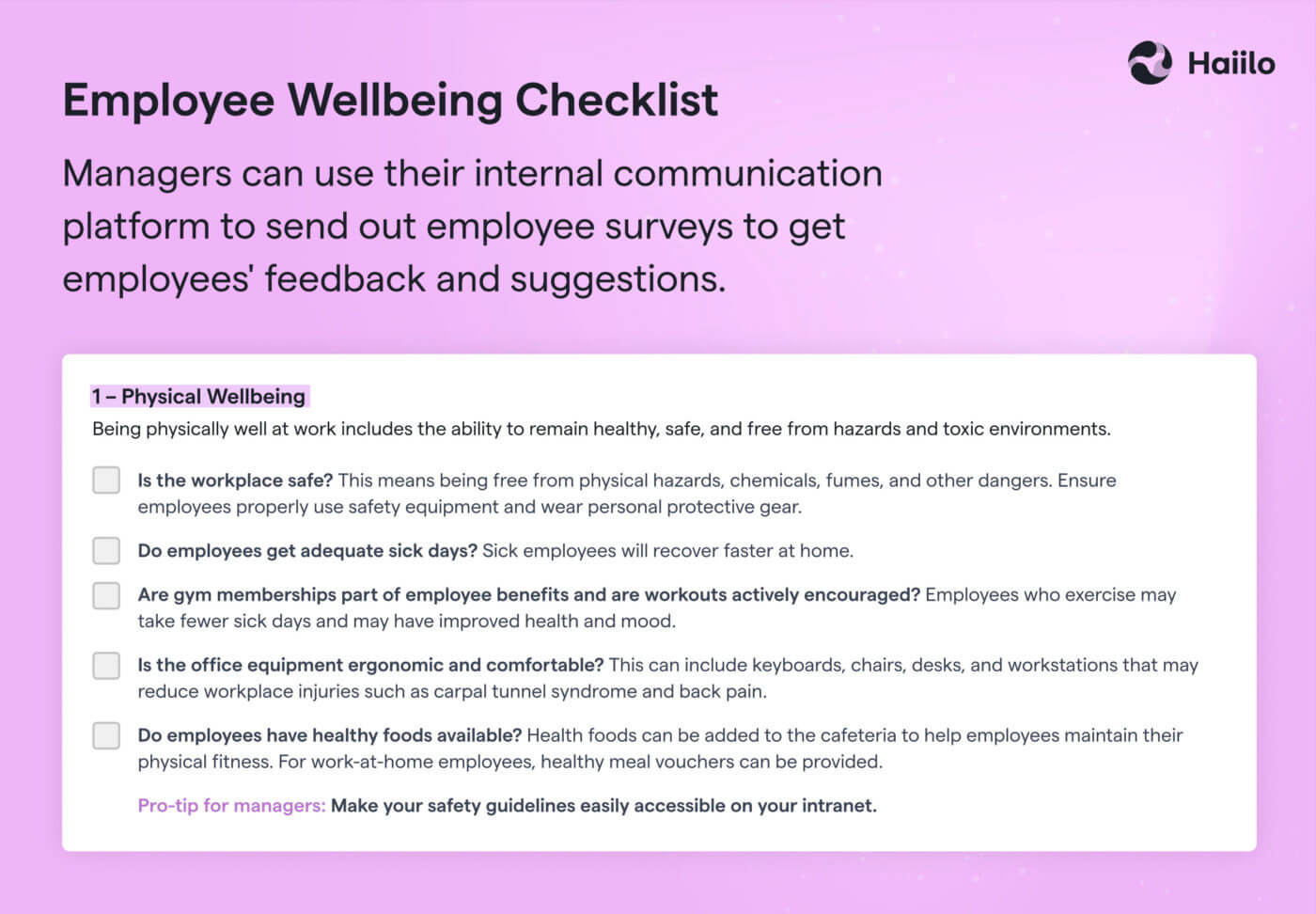Employee surveys have become a must-have for every organization. Since the emergence of COVID-19, many employers have started implementing regular employee surveys. But which employee survey questions should you ask to get the best insights into your workforce’s current state of mind and prevent poor employee experience?
Let’s dig deeper into all about employee survey questions!
The Importance of Employee Surveys Has Never Been Bigger
Employees’ share of voice is more important than ever. Remote and hybrid work make it harder for managers and organizations to understand the state of their workforce. This is one of the biggest reasons why we have entered the era of great resignation.
Furthermore, the percentage of disengaged employees in the workplace is still high. According to the latest Gallup report, 51% of employees are disengaged in the workplace, while 13% are actively disengaged.

Digital-only means of communication make it harder to cut through the noise. They make it harder for organizations to reach the right employees at the right time. Furthermore, asynchronous communication makes it easier for employees to experience information overload and miss important information.
Hence, getting and analyzing frequent feedback from employees is crucial for their engagement, productivity, and retention.
Employee surveys are the tool to do so.
3 Most Common Employee Survey Question Types
Depending on what you are trying to achieve with your surveys questions, you should carefully choose the question type.
When it comes to employee surveys, these are the 3 most common employee survey examples companies use.
Likert scale
Because of their simplicity, Likert scale questions are the most commonly used type of question in employee surveys. Most of the time, they ask an employee to express to what extent do they agree or disagree with a certain statement.
Here is an example of a Likert scale survey question:
My manager clearly communicates the company’s mission and vision

Rating scale
Rating scale questions are very similar to the Likert scale questions and they are used in a similar way. In rating scale questions, the question displays a scale of answer options from any range (0 to 10 for example). The employee then selects the number that most accurately represents their response.
NPS is the most widely used example of a rating scale question. In employee surveys, the question would be:
How likely are you to recommend your organization to friends and family?

Open-ended
Open-ended questions are used when you are trying to get detailed information about something. These question types are usually used in situations when you already have some information available. They are typically used as a follow-up question after a rating or Likert scale question.
For example, if an employee answers that they are unhappy with the way they receive recognition, you may ask them about how you could improve this experience.
Let’s now take a look at some employee survey examples. Because Likert and scale questions have better response rates due to their simplicity, we will focus on those question types.
1. Employee Engagement Survey Question Examples
71% of executives say that employee engagement is an important contributor to organizational success. Today, almost every organization performs engagement surveys. Some on a monthly basis, some do it quarterly, and some yearly.
These survey questions measure employees’ commitment, motivation, sense of purpose, and passion for their work and organization.
Let’s take a look at some employee engagement survey question examples.
- I would recommend my company as a great place to work
- I rarely think about leaving my current job
- I am proud to work for my company
- My company motivates me to do my best
- I look forward to coming to work
- I feel motivated to achieve great results
- I feel empowered at work
- I feel like my work contributes to company success
- I feel like my work is appreciated and recognized
- I am satisfied with my compensation and benefits
2. Employee Experience Survey Question Examples
Employee experience directly impacts employee engagement and productivity at work. Consequently, it directly impacts business success. According to research, happy employees with positive employee experience are up to 20% more productive at work, while unhappy employees take 15 more sick days each year than the average worker.
Let’s take a look at some examples of employee experience survey questions.
- I feel inspired to work for my organization
- I have opportunities for growth and career development
- I have a good relationship with my manager
- I am happy with the frequency and quality of feedback I get from my manager
- I have all the technology needed to do my job successfully
- Our organizational culture motivates people to be successful
- I understand how my work contributes to company success
- I have a good work-life balance
- I am happy with my compensation and benefits
- My organization cares about my wellbeing
3. Company Culture and Wellbeing Survey Question Examples
According to a survey by Hays, 47% of active job seekers want to leave their job because of bad company culture. Assessing company culture is, therefore, crucial.

Company culture surveys measure the point of view of employees. They are designed to assess company core values and whether they align with employees’ values. Let’s take a look at a few example questions.
- Executives at my organization contribute to a positive work culture
- I feel respected by my team
- My company invests in building a positive workplace culture
- My company cares about diversity and inclusion
- I rarely feel stressed at work
- My company cares about my wellbeing
- I feel like my share of voice matters in my organization
- I feel like I have a good work-life balance
- I look forward to coming to work every day
- I feel like my accomplishments are recognized
4. Employee Survey Questions for Managers
Managers are responsible for 70% of the variance in employee engagement. The relationship between employees and managers is one of the most critical parts of an organization’s growth. Hence, it is important to evaluate management policies, leadership style, and overall management performance.
- I believe in the approach taken by leaders to take to reach company objectives?
- My manager gives me clear goals and objectives
- I feel recognized by my manager
- I have a strong relationship with my superior
- People at the executive level contribute to a positive work culture
- My manager cares about me as a person
- My manager shows a genuine interest in your career goals
- When I approach my manager with a problem, I trust that they will listen
- I feel comfortable giving feedback to my manager
- I understand how my performance contributes to the organizational success
5. Survey Questions About Growth and Development
When employees see professional growth and career development opportunities in their organization, they are 2.5x more likely to be highly engaged than those who do not.

Therefore, these career development survey questions can be added to almost every employee survey.
- There is adequate company support for my skill development
- My job is aligned with my career goals
- I see myself working here in 3 years
- I feel like I have opportunities for growth and development in my organization
- My manager cares about my growth and development
- I can list concrete steps I need to take in order to move up in my organization within the next year
- I can see myself growing and developing my career in this company
- I find my job role exciting and challenging
- I feel like this is a good place to develop my career
- I have everything I need to advance in my role
6. Employee Survey About Organizational Alignment
Achieving organizational alignment is critical for every organization. When employees are aligned with their company’s mission, vision, and core values, they are more likely to understand what it takes to make a bigger impact. Unfortunately, many employees don’t understand their company’s goals and strategy for achieving those.
The very first step toward achving better organizational alignment is testing its current state. So let’s take a look at some employee survey examples to measure the level of organizational alignment in your company.
- In my company, communication open, honest, and transparent
- My organization clearly communicates its company’s mission and vision
- I understand what it takes to achieve my company’s OKRs
- I understand what it takes to achieve my individual KPIs
- I get frequent feedback from my manager about what can I do to improve my performance
- I have everything I need to achieve my KPIs
- Me and my team memebrs work collaborately toward achieving company’s goals
- It’s easy to work on cross-functional projects in my organization
- I have a clear understanding about how my work contributes to the company’s overall success
- I have a good visibility of my and my team’s work performance and achievements
Data-driven HR Is the New Must!
According to research, 56% of employees report that “their employer should understand them as well as they are expected to understand their customers”, while only 39% of employees in the study feel their workplaces were fulfilling this expectation.

To better understand your employees and encourage their share of voice, companies need to implement regular pulse surveys. However, just asking isn’t enough.
Analyzing surveys can be very time-consuming if you don’t have access to the right technology. As a consequence, many employers don’t act on their employees’ feedback.
Gartner’s analysis shows that, since the start of the pandemic, only 16% of employers are using technologies more frequently to monitor their employees’ productivity, engagement, wellbeing, and workplace experience.
For organizations with a lot of frontline workers who don’t have access to company computers this may seem like a mission impossible.
Every company should make sure to provide a way for every employee to complete electronic surveys. The ability to complete the survey via mobile devices such as phones or tablets may also enhance the survey experience.
Today, employers are increasingly using sophisticated tools to analyze the data generated from their employee electronic surveys. The most sophisticated solutions such as employee engagement apps even offer actionable recommendations for improvement.










